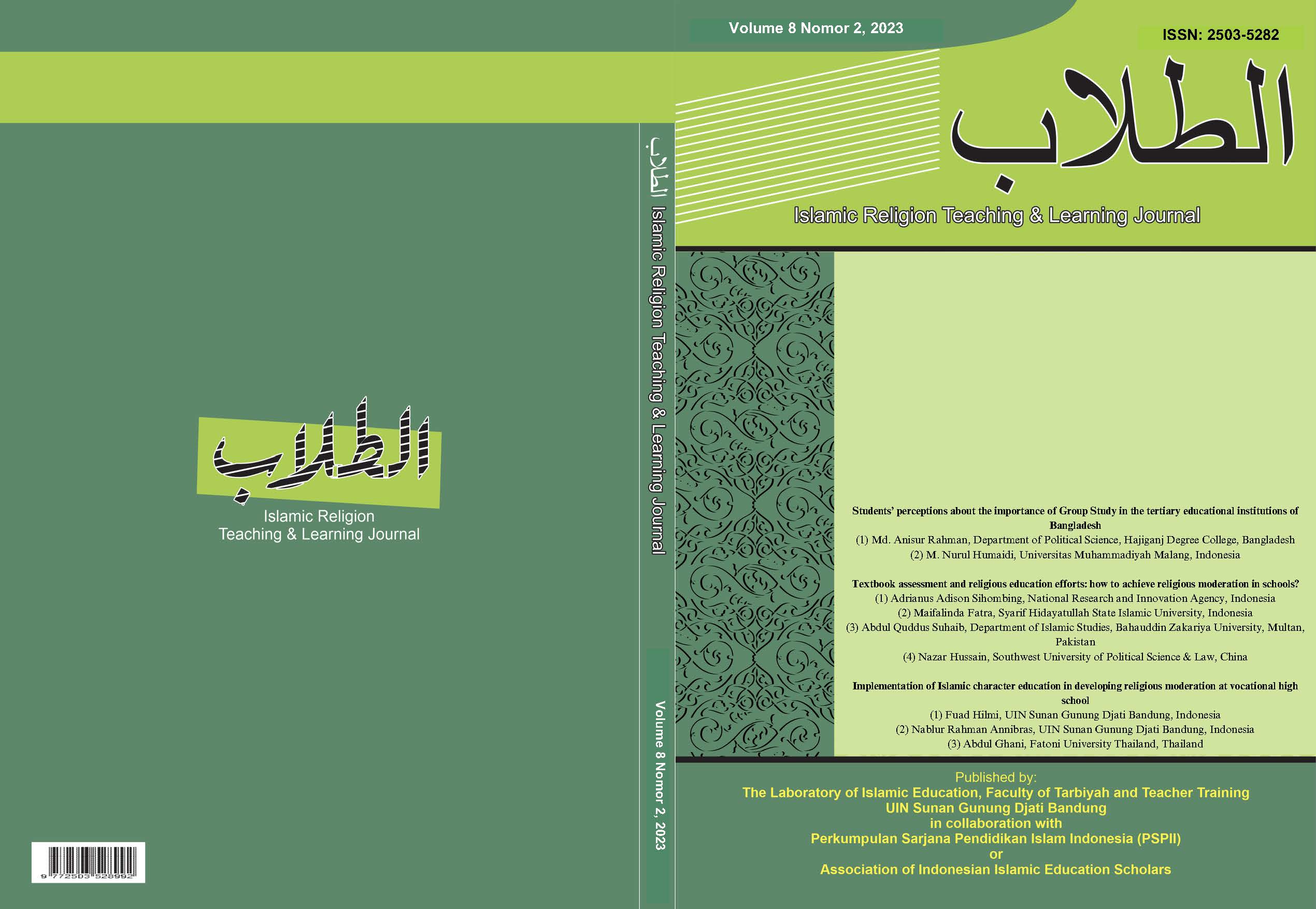The roles of interpersonal skills for teachers to learn Islamic Religious Education online
DOI:
https://doi.org/10.15575/ath.v8i2.23587Keywords:
Communication, Interpersonal, Islamic Religious Education, Learning, RemoteAbstract
The purpose of this research is to find out about the problems of applying interpersonal skills for Islamic Religious Education teachers in remote Islamic Religious Education learning at Kartasura District Middle School in 2021 and its alternative solutions. This study used a field qualitative method. Interviews and observation results provide primary data. Secondary data in the form of documentation is studied to obtain a clear picture of the research subject. This study shows that the problems of interpersonal communication between teachers and students during distance Islamic education learning are in the form of 1. Online media makes communication less memorable, tiring, and unidirectional. 2. To improve effective communication, teachers must spend more time outside of the classroom and involve students' parents. 3. There are distractions in the student and teacher environment that interfere with attention. Alternative solutions to these problems are: 1. Teachers need to emphasize the importance of quality communication over quantity and duration through role distribution for all students and refreshing students' minds before learning. 2. Fellow Islamic Education teachers and teachers in other fields of study can create collaborative learning to maximize the teaching process and also enable assignments that can accommodate cross-subject material. 3. Teachers need to strengthen effective relationships and communication to reduce the effects of environmental distractions.
Tujuan penelitian ini adalah untuk mengetahui bagaimana problematika penerapan keterampilan interpersonal bagi guru PAI dalam pembelajaran PAI jarak jauh di SMP Kecamatan Kartasura tahun 2021, dan alternatif solusinya. Penelitian ini menggunakan metode kualtiataif lapangan. Data primer berasal dari wawancara dan hasil obeservasi. Data skunder berupa dokumentasi dikaji untuk mepadapatkan gambaran yang lugas tentang subyek penelitian. Penelitian ini menunjukkan bahwa problematika komunikasi interpersonal antara guru dan siswa selama pembelajaran PAI jarak jauh, berupa: 1. Media daring menjadikan komunikasi kurang berkesan, melelahkan dan terkesan searah. 2. Guru memerlukan waktu tambahan di luar kelas dan melibatkan orang tua siswa untuk meningkatkan komunikasi efektif. 3. Ada distraksi di lingkungan siswa dan guru yang mengganggu atensi. Alternatif solusi untuk problematika tersebut adalah: 1. Guru perlu menekankan pentingnya kualitas komunikasi bukan pada kuantitas dan durasi melalui distribusi peran bagi seluruh siswa dan penyegaran pikiran siswa sebelum pembelajaran. 2. Sesama guru PAI maupun guru bidang studi lain dapat menciptakan pembelajaran kolaboratif untuk memaksimalkan proses pengajaran dan memungkinkan juga penugasan yang dapat mewadahi materi lintas mata pelajaran 3. Guru perlu menguatkan relasi dan komunikasi efektif untuk mengurangi efek distraksi lingkungan.Â
References
Ahmad, M. (2019). Komunikasi Sebagai Wujud Kompetensi Sosial Guru Di Sekolah. Jurnal Komodifikasi, Vol. 7 No., 33–44.
Arfandi, & Samsudin, M. A. (2021). Peran Guru Profesional Sebagai fasilitator dan Komunikator Dalam Kegiatan Belajar Mengajar. Edupedia : Jurnal Studi Pendidikan Dan Pedagogi Islam, 5(2), 37–45. https://journal.ibrahimy.ac.id/index.php/edupedia/article/view/1078
Ayun, P. Q. (2016). Penggunaan Instant Messenger dan Komunikasi Interpersonal Remaja. Jurnal Ilmu Sosial, 15(2), 111. https://doi.org/10.14710/jis.15.2.2016.111-120
Chaeruman, U. A. (2020). Ruang Belajar Baru Dan Implikasi Terhadap Pembelajaran Di Era Tatanan Baru. Kwangsan: Jurnal Teknologi Pendidikan, 8(1), 142. https://doi.org/10.31800/jtp.kw.v8n1.p142--153
Dwiayuni, M. A. (2019). Keterampilan Komunikasi Interpersonal Kepala Sekolah dalam Perspektif Manajemen Perubahan. Journal2.Um.Ac.Id, 4(2), 55–66. http://journal2.um.ac.id/index.php/jktpk/article/view/10792
Elfiky, I. (2017). Terapi Berpikir Positif. PT. Serambi Ilmu Semesta.
Emeilia, R. I., & Muntazah, A. (2021). Hambatan Komunikasi Dalam Pembelajaran Online Di Masa Pandemi Covid-19. Journal of Chemical Information and Modeling, 6(2), 155–166.
Fadhal, S. (2020). Hambatan Komunikasi dan Budaya dalam Pembelajaran Daring pada Masa Pandemi COVID-19. In KOLABORASI LAWAN (HOAKS) COVID-19: Kampanye, Riset dan Pengalaman Japelidi di Tengah Pandemi (pp. 273–290). https://proceeding.unnes.ac.id/index.php/snpasca/article/download/637/555
Hasbiyallah, H., Faznah, F., & Ningsih, A. (2022). Emotion Control Education in the New Normal Era Through Riyadlah Dhikr. Atthulab: Islamic Religion Teaching and Learning Journal, 7(1), 1–13. https://doi.org/10.15575/ath.v7i1.12610
Kurniasih, Y. (2017). Keterampilan Interpersonal: Upaya Menciptakan Komunikasi Efektif. Journal of Health Studies, 1(1), 72–77.
Moleong, L. J. (2017). Metode Penelitian Kualitatif (Edisi Revi). Remaja Rosdakarya.
Oviyanti, F. (2017). Urgensi Kecerdasan Interpersonal Bagi Guru. Tadrib: Jurnal Pendidikan Agama Islam, 3(1), 75.
Patriana, E. (2014). Komunikasi Interpersonal Yang Berlangsung Di Bapas Surakarta. Journal of Rural and Development, 5(2), 203–214.
Pontoh, W. P. (2013). Peranan Komunikasi Interpersonal Guru Dalam Meningkatkan Pengetahuan Anak. Jurnal Acta Diurna, 1(1), 11.
Rianatha, L., & Sawitri, D. R. (2015). Hubungan Antara Komunikasi Interpersonal Guru-Siswa Dengan Self-Regulated Learning Pada Siswa SMAN 9 Semarang. Jurnal Empati, 4(April), 209–213.
Sakdiah, H. (2015). Urgensi Interpersonal Skill Dalam Dakwah Persuasif. Jurnal Ilmu Dakwah, 35(1), 1–14.
Sujarwanto, I. (2012). Interaksi Sosial Antar Umat Beragama (Studi Kasus Pada Masyarakat Karangmalang Kedungbanteng Kabupaten Tegal). Journal of Educational Social Studies, 1(2).
Sutapa, M. (2006). Membangun Komunikasi Efektif Di Sekolah. Jurnal Manajemen Pendidikan, 2(2), 69–76.
Toharudin, M. (2020). Komunikasi dalam pembelajaran di era pandemi covid-19. Prosiding Seminar Nasional FIP 2020, 7(9), 238–248.
Zulkifli, M. (2019). Peranan Komunikasi Interpersonal Guru dalam Meningkatkan Pengetahuan Anak (Studi pada Guru-guru di PAUD Kharisma dan PAUD Lestari). Pamator Journal, 12(1). https://doi.org/10.21107/pamator.v12i1.5180
Downloads
Published
How to Cite
Issue
Section
License
Authors who publish with this journal agree to the following terms:
- Authors retain copyright and grant the journal right of first publication with the work simultaneously licensed under a Creative Commons Attribution-ShareAlike License that allows others to share the work with an acknowledgement of the work's authorship and initial publication in this journal.
- Authors are able to enter into separate, additional contractual arrangements for the non-exclusive distribution of the journal's published version of the work (e.g., post it to an institutional repository or publish it in a book), with an acknowledgement of its initial publication in this journal.
- Authors are permitted and encouraged to post their work online (e.g., in institutional repositories or on their website) prior to and during the submission process, as it can lead to productive exchanges, as well as earlier and greater citation of published work (See The Effect of Open Access).






